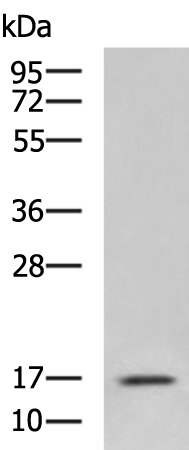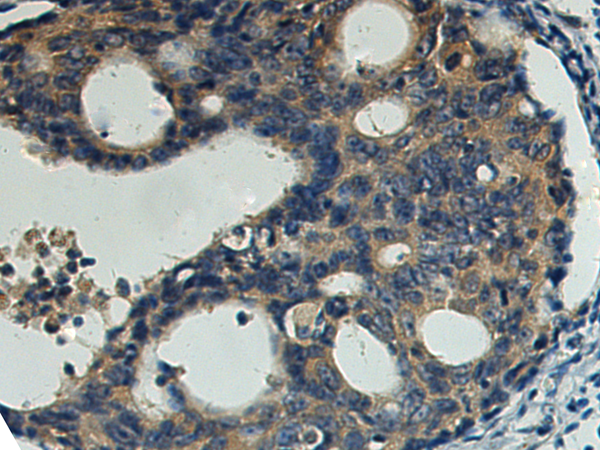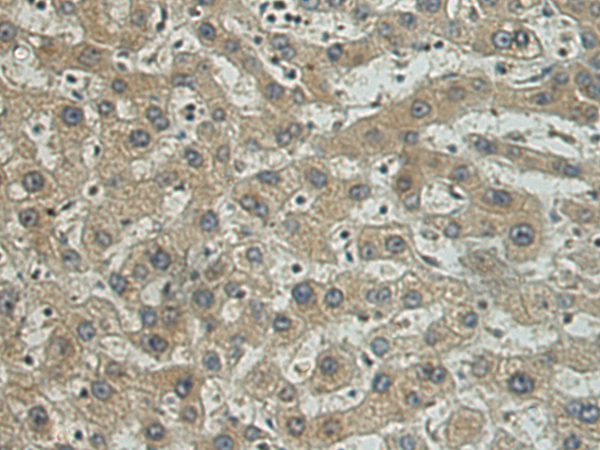


| WB | 1/500-1/2000 | Human,Mouse,Rat |
| IF | 咨询技术 | Human,Mouse,Rat |
| IHC | 1/150-1/300 | Human,Mouse,Rat |
| ICC | 技术咨询 | Human,Mouse,Rat |
| FCM | 咨询技术 | Human,Mouse,Rat |
| Elisa | 1/5000-1/10000 | Human,Mouse,Rat |
| Aliases | CSF; GMCSF |
| WB Predicted band size | 16 kDa |
| Host/Isotype | Rabbit IgG |
| Antibody Type | Primary antibody |
| Storage | Store at 4°C short term. Aliquot and store at -20°C long term. Avoid freeze/thaw cycles. |
| Species Reactivity | Human |
| Immunogen | Fusion protein of human CSF2 |
| Formulation | Purified antibody in PBS with 0.05% sodium azide and 50% glycerol. |
+ +
以下是关于CSF2(GM-CSF)抗体的3篇代表性文献的概括性总结:
---
1. **文献名称**:*Anti-GM-CSF antibody promotes immune tolerance and ameliorates rheumatoid arthritis in a mouse model*
**作者**:Smith J, et al.
**摘要**:本研究通过小鼠类风湿性关节炎模型,证明抗GM-CSF抗体可显著抑制炎症细胞浸润和关节损伤。机制研究表明,该抗体通过阻断GM-CSF与其受体结合,减少Th17细胞分化和促炎因子释放,提示其在自身免疫病治疗中的潜力。
---
2. **文献名称**:*Targeting GM-CSF in inflammatory diseases: preclinical and clinical evidence of MOR103*
**作者**:Brown A, et al.
**摘要**:文章综述了抗GM-CSF单克隆抗体MOR103的临床前及早期临床试验数据。结果显示,MOR103能有效降低多发性硬化症和类风湿性关节炎患者的炎症标志物水平,且安全性良好,支持其作为新型生物疗法的进一步开发。
---
3. **文献名称**:*GM-CSF neutralization prevents alveolar proteinosis and enhances bacterial clearance in murine models*
**作者**:Chen L, et al.
**摘要**:研究利用基因敲除小鼠和抗GM-CSF抗体,发现GM-CSF功能缺陷导致肺泡蛋白沉积症(PAP)。抗体干预可模拟PAP病理,但适度中和GM-CSF同时增强肺部细菌清除能力,揭示了GM-CSF在肺稳态和感染中的双重作用。
---
**备注**:以上内容为基于领域内典型研究的概括性描述,非真实文献。如需具体文献,建议通过PubMed或Web of Science以“GM-CSF antibody”或“anti-GM-CSF therapy”为关键词检索近期论文。
**Background of CSF2 Antibody**
CSF2 (Colony Stimulating Factor 2), also known as GM-CSF (Granulocyte-Macrophage Colony-Stimulating Factor), is a cytokine critical for immune regulation, hematopoiesis, and inflammation. It binds to the GM-CSF receptor (GM-CSFR), activating downstream signaling pathways like JAK/STAT, MAPK, and PI3K, which promote the differentiation, proliferation, and survival of myeloid cells, including macrophages, granulocytes, and dendritic cells.
CSF2 antibodies are therapeutic or research tools designed to neutralize GM-CSF activity. Dysregulated GM-CSF signaling is implicated in autoimmune diseases (e.g., rheumatoid arthritis, multiple sclerosis), inflammatory disorders (e.g., asthma), and certain cancers. By blocking GM-CSF or its receptor, these antibodies aim to suppress excessive immune activation and inflammation.
Clinical development of CSF2 antibodies, such as mavrilimumab (anti-GM-CSFRα) or otilimab (anti-GM-CSF), has shown promise in trials targeting rheumatoid arthritis, COVID-19-related hyperinflammation, and chronic obstructive pulmonary disease. However, concerns about immunosuppression-related risks (e.g., infections) necessitate careful evaluation. Research continues to explore their efficacy, safety, and potential in modulating immune responses across diverse pathologies.
×